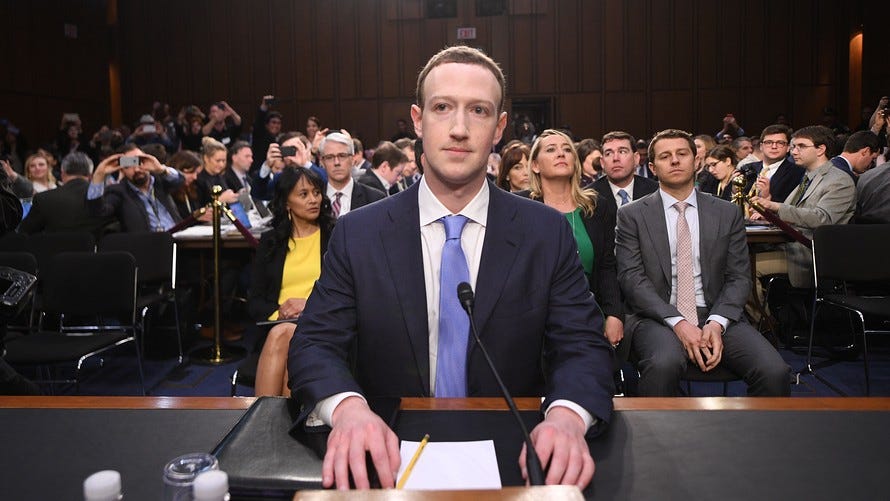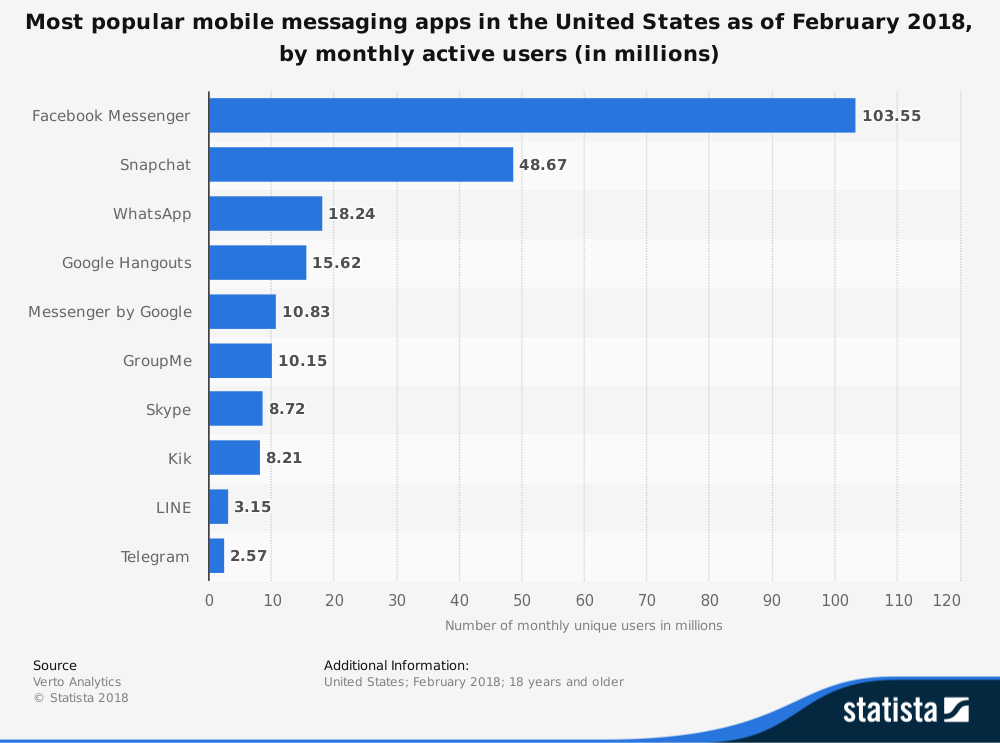Latest news about Bitcoin and all cryptocurrencies. Your daily crypto news habit.

Besides the massive Cambridge Analytica scandal, what makes Facebook the one answering the questions about data collection by big tech companies? Facebook is not alone as the internet’s privacy villain and other companies arguably collect even more information than Facebook. Here’s a look at why Facebook is taking the floor in answering questions from the Senate.
People Know Who Mark Zuckerberg Is
Mark Zuckerberg is likely one of the most recognizable CEOs in the world. Thanks to The Social Network, a movie about how Zuck founded Facebook, people know more about his story than any other CEO.
Other CEOs: Alphabet’s Larry Page, Google’s Sundar Pichai, Amazon’s Jeff Bezos, and Twitter’s Jack Dorsey are well known in the tech realm. However most people wouldn’t recognize them in person or know much about them beyond their position. Zuckerberg is an icon, he embraces the spotlight — even if people criticize his authenticity.
body[data-twttr-rendered="true"] {background-color: transparent;}.twitter-tweet {margin: auto !important;}
don't forget to drink the water, humans like water" https://t.co/RyhWE74Sl4
function notifyResize(height) {height = height ? height : document.documentElement.offsetHeight; var resized = false; if (window.donkey && donkey.resize) {donkey.resize(height); resized = true;}if (parent && parent._resizeIframe) {var obj = {iframe: window.frameElement, height: height}; parent._resizeIframe(obj); resized = true;}if (window.location && window.location.hash === "#amp=1" && window.parent && window.parent.postMessage) {window.parent.postMessage({sentinel: "amp", type: "embed-size", height: height}, "*");}if (window.webkit && window.webkit.messageHandlers && window.webkit.messageHandlers.resize) {window.webkit.messageHandlers.resize.postMessage(height); resized = true;}return resized;}twttr.events.bind('rendered', function (event) {notifyResize();}); twttr.events.bind('resize', function (event) {notifyResize();});if (parent && parent._resizeIframe) {var maxWidth = parseInt(window.frameElement.getAttribute("width")); if ( 500 < maxWidth) {window.frameElement.setAttribute("width", "500");}}People Use Facebook on a Daily Basis
4 billion people on average log onto Facebook daily and are considered daily active users. Internet users can relate to concerns about Facebook because they use the service so often and have a deep connection with it.
Adding privacy protection to Facebook is something people can directly relate to and understand.
People Agree To Facebook’s Privacy Policy & Terms of Service
Facebook uses a broad blanket privacy policy when users create an account. However, many features on Facebook are opt-out, meaning they are enabled by default and users have to choose to turn them off.
These policies, which very few users actually read, are a problem. If people can’t easily understand how their data is used, the privacy policies aren’t accomplishing their purpose for the users (only protecting the companies legally).
Users Are Generally Comfortable with Sharing Information on Facebook
People are comfortable sharing content on Facebook. Whether it’s a photo of their family or a status update, putting this out there has become the norm for Facebook users. Because people perceive Facebook as a social environment, they are given reinforcement — likes, shares, comments — for sharing information.
Make your online presence work for you, not against you. Employers and admissions officers report that the internet can be a good place for applicants to present their talents, professionalism, and sociability.-Source: DigitalResponsibility.org
Filling out a profile on Facebook involves making certain information about you public, at least to your friends. People don’t associate sharing information with Google or Amazon, by contrast.
Facebook’s Data Collection Goes Well Beyond It’s Core Product
Facebook says it has removed these targeting options, but prior to 2015 users could be targeted under the categories “diagnosis with HIV or AIDS”, “erectile dysfunction” and “binge-eating disorder awareness”. How would Facebook gather this data through its core products?
“Facebook can learn almost anything about you by using artificial intelligence to analyze your behavior,” said Peter Eckersley, the chief computer scientist for the Electronic Frontier Foundation, a digital rights nonprofit. “That knowledge turns out be perfect both for advertising and propaganda. Will Facebook ever prevent itself from learning people’s political views, or other sensitive facts about them?”
Facebook uses its many apps and products to collect information about users and their connections.
Facebook’s Product Line
- Messenger
- Internet.org by Facebook
- Oculus
Facebook Has Virtually No Direct Competitors
Mark Zuckerberg may be adamant that Facebook is not a monopoly, but the numbers don’t lie. There are companies that provide parts of what Facebook does, but none are true alternatives.
Even companies calling themselves alternatives to Facebook offer just a portion of Facebook’s features. And none can even come close to Facebook’s 2.2 billion users.
Facebook Offers Very Little Transparency
Unfortunately because Facebook has so little competition, they don’t need to offer transparency. And users have demonstrated that even if they would like for the platform to share more about how it works, they aren’t willing to delete their accounts over it.
Facebook discloses which information it gathers in its terms of use. However, users are often surprised to learn about the social network sharing other information with third-parties such as advertisers or other firms, like Cambridge Analytica.
 Source: Statista.com
Source: Statista.com
The company owns Facebook Messenger and WhatsApp, making it the biggest player in the mobile messaging market by far. Messaging as a market is unique because users rely on other people using the same apps as them to communicate. If a user wants to switch to a different messaging app, in most cases they need the people they are communicating with to also switch.
Conclusion
So Facebook’s celebrity CEO, it’s massive user base and its monopoly status, make it a prime example for the tech industry as a whole. Because Facebook is so ingrained throughout the internet and every browsing session, people can clearly see the effects of data collection. How Facebook responds to lawmakers’ questions will impact the future of privacy regulations for the entire internet and tech industry.
Read More
- Data Privacy Concerns with Google
- Facebook May Have Consent, But Not Approval - Choose To Encrypt
- Facebook Won't Fix the Internet's Bigger Privacy Problem - Choose To Encrypt
Why Facebook Is The Perfect Representative of Tech’s Privacy Problem was originally published in Hacker Noon on Medium, where people are continuing the conversation by highlighting and responding to this story.
Disclaimer
The views and opinions expressed in this article are solely those of the authors and do not reflect the views of Bitcoin Insider. Every investment and trading move involves risk - this is especially true for cryptocurrencies given their volatility. We strongly advise our readers to conduct their own research when making a decision.
